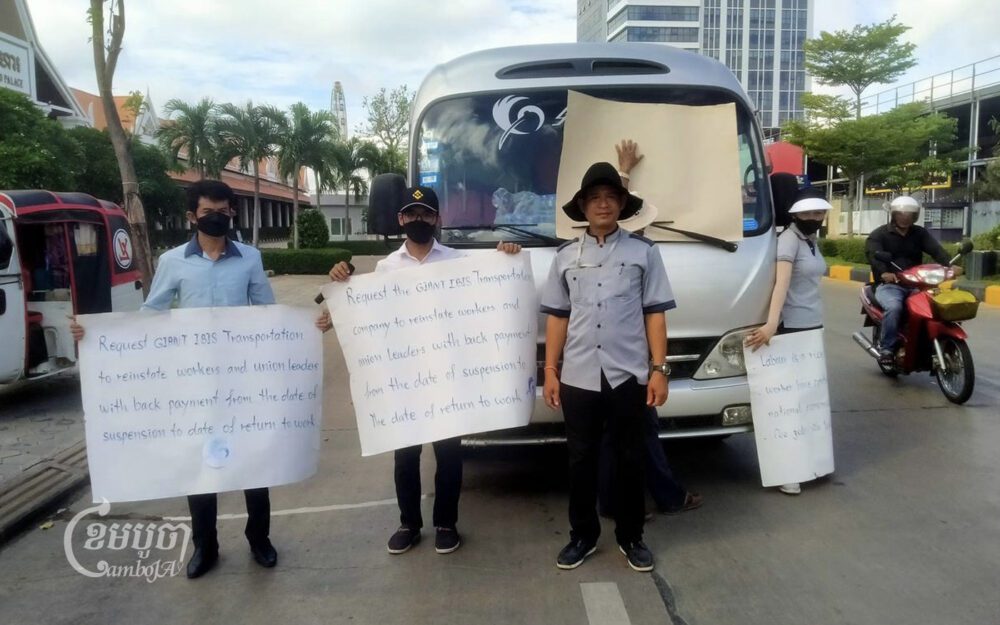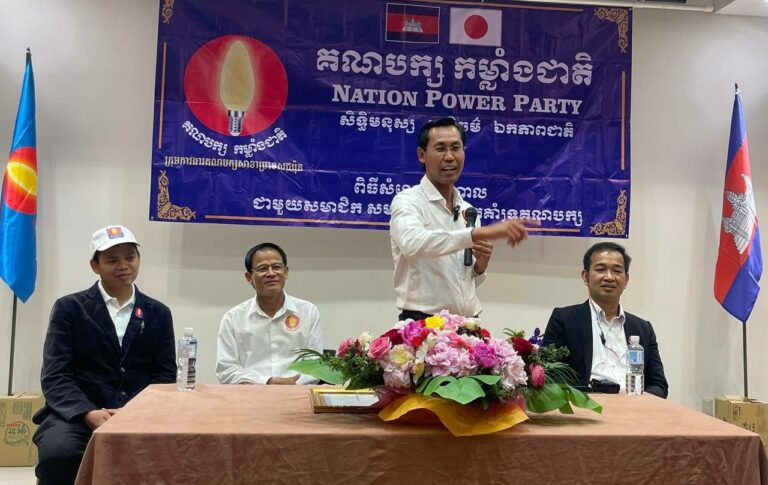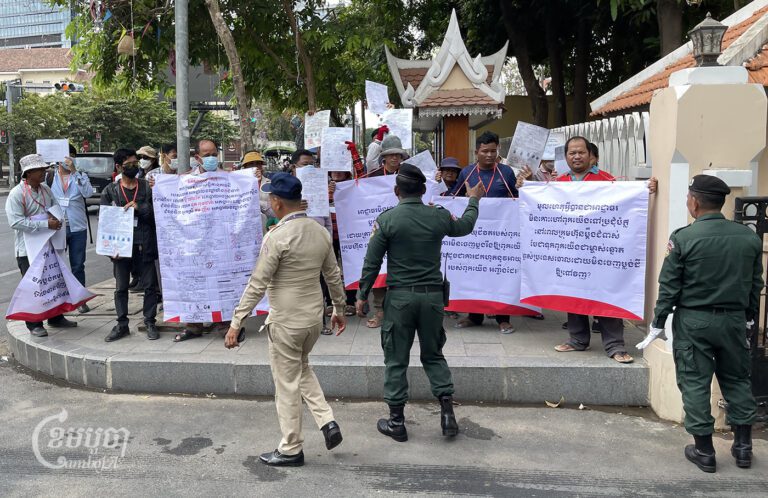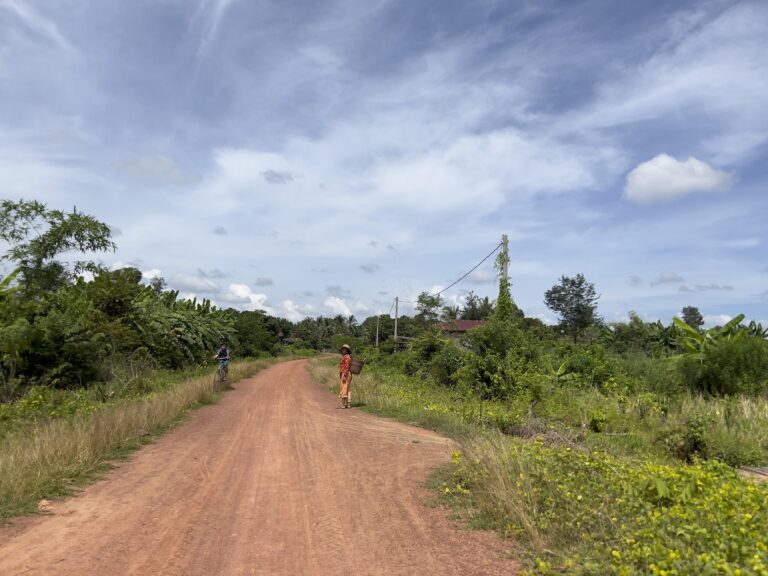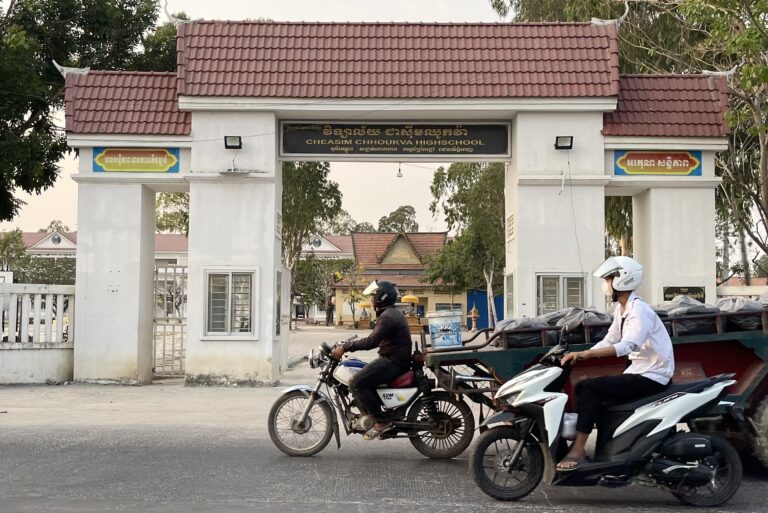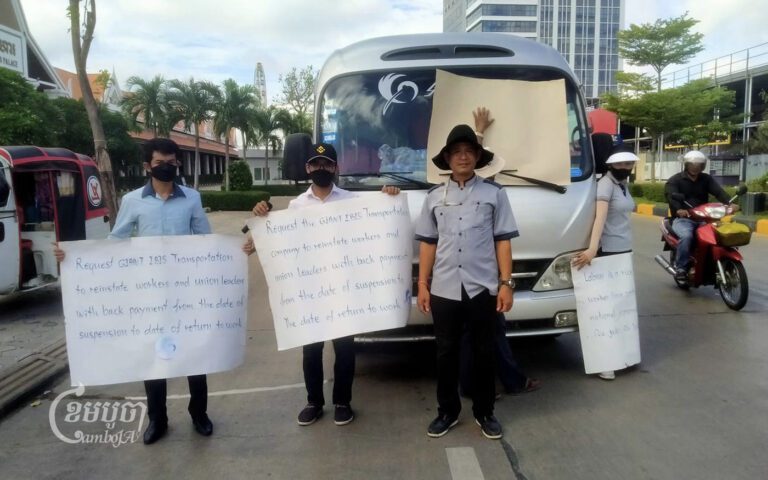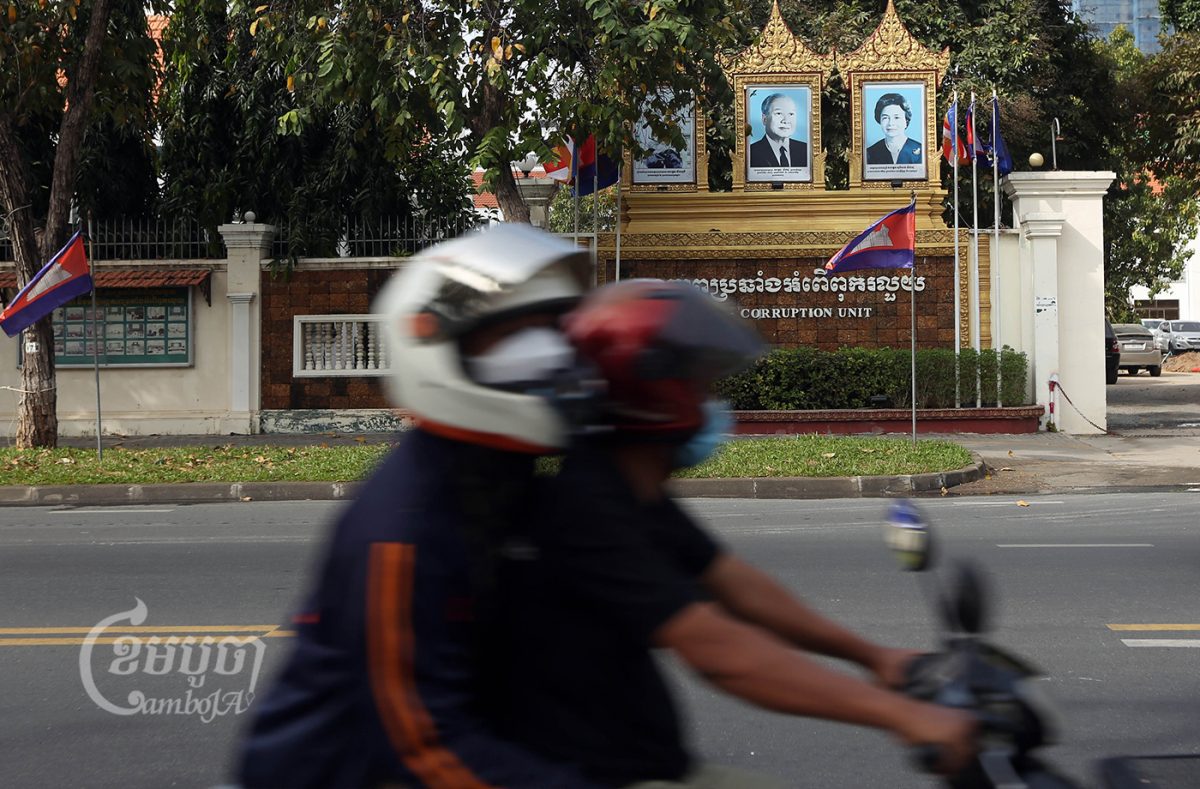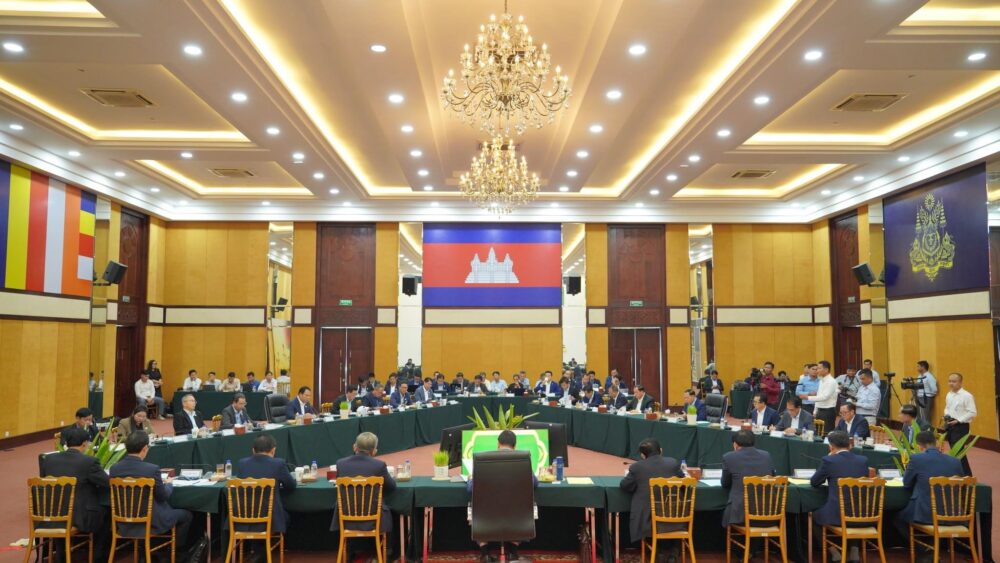Living in a small concrete house with his wife and two young children, one kilometer away from Takhmao Bridge, ex-Giant Ibis Transportation employee Or Chanthy, 45, contemplates life’s challenges. In 2020, Chanthy, a union member, was among 80 bus drivers who were made redundant without severance and seniority payment when the company suspended operations during the Covid-19 outbreak. Severance and seniority payments are compulsory under the Labor Law.
“My life has been hit hard since I lost my job and was not reinstated after that. My salary supplemented my wife’s tailoring business, but as you can see I have not received any payment from them until now,” he lamented. “I don’t know what the company is up to [but] I need that money to feed my family.”
In Cambodia, as the head of the family, men are traditionally viewed as the sole breadwinner. Losing his job at Giant Ibis means that he cannot manage this responsibility effectively. Owing to that, Chanthy has taken on work as a driver for a private bus transportation service in his village, where he plies daily between Phnom Penh and Sihanoukville. He takes home less than $15 on a round-trip, which is far less than what he was paid in Giant Ibis.
When CamboJA visited his home on September 30, Chanthy was preparing to go to central Phnom Penh to fix a few broken spare parts as he needed to get back to work the next day. Sitting on a chair, he said, “There are no other means to earn a proper income. I cannot secure any work as the company warned me not to take on another contractual job, otherwise I would not receive any severance and seniority payments,” he said, eyes glistening.

Although Chanthy is seen as the household head and a main income earner, his wife Chea Sina, a homemaker, is the primary caregiver. The 43-year-old takes care of the household expenses now, including organizing the family budget and children’s education.
For over 10 years, Sina has been running a small tailoring business in their house. She recalls that before the pandemic, her business was strong, earning about $1,000 a month. At the time, she and Chanthy almost never had time to sleep. Sina would be busy sewing clothes, while Chanthy would hasten the ironing in order to get them ready for their customers. But, in the last few years since Covid-19 her business has been experiencing challenges. Nowadays, she earns less than $100 from the business.
“Prior to Covid-19, we could earn quite a lot. My husband and I worked assiduously everyday, while he also carried on with his driving job. We hardly had any time to breathe,” she reminisced. Sitting in front of her sewing machine without the clickety-clack sound resonating through the room, Sina sighed, “Now our income is shrinking. People are spending less on what they think is unnecessary as household income has reduced.”
While it is difficult to make a living, also partially due to her husband’s inconsistent job, Sina shoulders the responsibility of repaying a $13,000 loan with a 1.5 percent interest rate over five years, which she took with Active People’s Microfinance Institution Plc. They are now saddled with the debt, which Chanthy used to buy a piece of land to build their current house. It has left them with an annual repayment obligation of $5,000 for the next two years, a sum which is almost double the average annual income of most Cambodians.
“Sometimes we need to borrow from moneylenders in the village to repay the formal loan,” she rued.
“Yes, it is difficult for us as we are facing a lot of hardship. So, with Chanthy having lost a proper income, we are barely able to cope with household expenses,” Sina said, adding that their expenditure is higher than their income, which has induced a budget deficit.

Ran Bro Seur, another union member from Battambang province, said having lost his job with no guarantee of being reinstated as well as the company’s alleged inaction of settling the legally required payments have taken a toll on him. Bro Seur had worked for Giant Ibis for three years prior to the suspension in October 2020.
The sixth out of 10 children in his family, Bro Seur is responsible for his elderly parents, aged between 65 and 70. He spends his days farming their one hectare land and raising chickens to be sold. “I have an obligation to look after my old and frail parents,” Bro Seur said, his anger evident as he talks about Giant Ibis’ failure to comply with the law, and leaving many employees jobless.
“The company did not compensate us, not even a single cent. When we lost our job, it significantly impacted our ability to support our family. It is important that we have a job to generate income,” he said. Apparently, the company requested to negotiate after Pchum Ben, but Bro Seur is not convinced. “I have already lost faith in the company’s promise,” he shot back.
Advocate for Union Rights and Unresolved Payments
Giant Ibis is said to have incurred losses, eventually collapsing as a result of Covid-19 and no longer able to operate properly. Due to that, their workers were made redundant and had to seek alternative work to make ends meet. A temporary interruption of income from employment occurred as a result of prolonged work suspension to the union, led by Siem Morady.
In April 2020, Giant Ibis union leader Morady and about 80 other employees were laid off. At the time, the company provided them an option to be reinstated later without no pay in the interim, which is against the law. They were allegedly told by Giant Ibis that a union member could be “permanently fired and offered only $1,000 as overall payment”. But, going by the law, each suspended employee should be given $7,000 to $8,000 including back pay from the date of their suspension, Morady said.
“The company committed a totally illegal act, which resulted in the loss of benefits and severance payments during the suspension,” he said. “And it was also an intention of theirs for us to quit on our own after operations restarted [early 2022 following Covid-19] because they did not take us back.”
The union was formed by Morady and his colleagues in May 2020, a month after they were laid off and by October that year, the union was legally registered by the Ministry of Labor, he said, while showing the certificate.
Its first protest took place on April 23 this year in front of the company’s headquarters in Phnom Penh where they demanded for their unpaid severance and seniority payments. But their strong calls did not come to fruition as no mediation was put forward at the time.
On May 13, this year, the bus company agreed to pay the unresolved payments on May 22 while pledging to comply with the law. It also agreed to compensate 30 union workers who were laid off, but that they would not be reinstated, Morady said. “However, Giant Ibis was silent on the day they agreed to pay, and later asked for another deadline.”
Negotiations eventually reached a stalemate, as the Labor Ministry, which facilitated the talks appeared to not have a clear jurisdiction to compel Giant Ibis to make a definite decision. Following that, Morady’s union gave the company “once last chance” to calculate and provide severance payment and other benefits owed to the employees by June 23. The union called off the negotiations, initially mediated by the ministry, with the Giant Ibis representative, saying that “it was just a ploy”.
“I do not know what the Labor Ministry would do with us. They have full jurisdiction to compel the company but in fact they cannot resolve the matter,” Morady says.
Two thirds of the union retreated from their commitment to continue fighting for what was owed to them because they could not afford the travel costs back and forth the province. They also needed to find jobs to support their family. Currently, only 10 members remain with the union and continue to regularly demand for their dues. “We will continue advocating for our rights until we attain justice for all our members,” Morady said.
Whenever union members arrive in Phnom Penh to protest, he offers them a place to stay in his house. “Sometimes we boil some eggs and eat together. We will continue to hold on to our principles and are prepared to fight for our right to the very end.”
Like other laid off union members, Chanthy vented his indignation over the Ministry of Labor’s alleged inability to enforce the law against Giant Ibis. He told CamboJA that Cambodia’s judicial system is plagued with problems and is regularly identified as one of the country’s “most corrupt institutions.” On the union’s negotiation with the ministry, Chanthy expressed his disbelief, saying that, “Fair and impartial resolution of our grievances through the system cannot consistently be attained.”
“They tend to lean towards powerful companies. The system creates non-viable measures to effectively adjudicate the case,” Chanthy said.
His wife Sina, who stood by him, has never complained about his activism and instead encouraged him to do what he thought was right, despite them struggling to earn a living.
“Even though my husband cannot earn as much money as he used to, I am not mad at him. I will stand by him as he fights against this abusive company,” Sina told CamboJA.
Minister of Labor Heng Sour did not respond to CamboJA’s request for comment. However, in June, Sour, who was the ministry spokesperson at the time, told CamboJA that “the ministry requires the company to implement the agreement” and provide compensation. Despite the ministry’s comment, Giant Ibis has repeatedly failed to meet the deadline to finalize settlements, which were initially set to conclude in late May.
Ath Thorn, president of the Cambodian Labor Confederation, which helped the Giant Ibis employees unionize in 2020, said the company’s claims of miscalculating the severance and seniority payments for laid-off employees were just excuses.
“The company must consider paying that amount to the union according to the labor law. When people don’t have work, it impacts their livelihood. As such, the union must continue protesting,” Ath Thorn told CamboJA.
The union’s relentless advocacy to demand justice is their right, he said, adding that he believed that the company had violated the law and the ministry was “not doing enough” to compel the company to comply.
According to Article 95 of the Labor Law, “dismissed workers have, for two years, the priority to be re-hired to the same position in the enterprise”. “Employers are also required by the law to pay seniority and severance payments in the event of dismissal, as well as damages in the event that a labor contract is terminated abruptly or for an abusive breach.”
Giant Ibis’s Owner and Alleged Abuse
Giant Ibis, which describes itself as Cambodia’s “leading responsible bus company,” was launched by tycoon Kith Meng’s Royal Group Co Ltd in 2011. It started off with domestic operations in 2012 before expanding to Vietnam and Thailand.
Neither Meng nor the Royal Group responded to requests for comment. Giant Ibis Transport could not be reached for comment.
An Australian record named Jacob Monstross as the “founder and managing partner” of Giant Ibis. The same record also mentions Jacob Monstross as a senior member of Royal Group.
However, there is no public record linking the corporate relationship. There is also no record of an ownership transfer or the sale of Giant Ibis from within Royal Group on any of the companies’ websites or the Ministry of Commerce.
However, the Ministry of Commerce has listed a “Ngeth Bora” as the chairman of the Board of Directors, who union leader Morady confirmed as being the wife of Jacob Monstross. Ngeth Bora could not be reached for comment.

Morady told CamboJA that Monstross is currently the managing director of the Royal Cambodian Limousine Service Company, also a subsidiary of the Royal Group conglomerate.
Morady and his colleagues in the union alleged that Monstross’ Giant Ibis had carried out abusive acts against the union. They claimed that the company “did not care about the suspended employees’ benefits”, and that Giant Ibis effectively engaged in “union-busting behavior”.
“The company also recruited new workers instead of reinstating the suspended drivers. This is an outright violation of the labor law or our rights. They withheld the payment [despite] promising to comply with the ministry’s [instruction],” he said.
Morady charged that Giant Ibis ostensibly undermined the union’s principle, telling them that “one day you [the union] will disband when you get tired”. “I recall Jacob Monstross shouting this at the members.”
A Giant Ibis representative, Ou Phanny, who is alleged to have acted aggressively towards the union and insulted members during the protest, could not be reached for comment. Phanny had previously denied this allegation when CamboJA contacted him in May.
Labor Ministry spokesperson, Katta Orn told CamboJA that the Labor Dispute Department mediated a negotiation between both parties three times. “But both parties could not reach a compromise to settle the dispute,” he said.
Since then, there has been “no request for negotiation” put forward by either party to his department, Orn added.
‘Until His Last Breath’
Hay Som Ol, a Giant Ibis union member, passed away in June due to pneumonia, but his advocacy for labor rights remains deeply entrenched in their struggle. His endless protest has spurred the others to continue seeking justice.
His advocacy work is acclaimed by the union as the foundation of a democratic society—the means by which people protect their liberty in a society of equals and the means by which workers protect their rights. All workers deserve decent jobs, where they are treated with respect and dignity.
“We are standing for our rights and forming unions to make life better for us and our families. The Giant Ibis Union serves as an advocate for activists, defending worker rights, sharing information with unionists and providing support for struggling unions,” Morady said, recalling Som Ol’s commitment to the union. Som Ol was highly appreciated as an active unionist.
Som Ol worked for the company since its inauguration in 2012. One among those who were laid off, he became a strong participant in union activities with Morady.
He died in Khmer-Soviet Hospital, where the fees for his treatment cost a fortune. As his family struggled to pay, they were inclined to settle for a disproportionate compensation from Giant Ibis. About $2,000 was offered, less than a third which was legally owed to him in accordance with the labor law.
Som Ol’s wife, Pil Mony, who fainted upon hearing her husband’s death, choked up while talking about him. “He was very committed to his union. Even though he was hospitalized, he still wanted information on the progress of the protest. He was a fighter until his last breath.”


